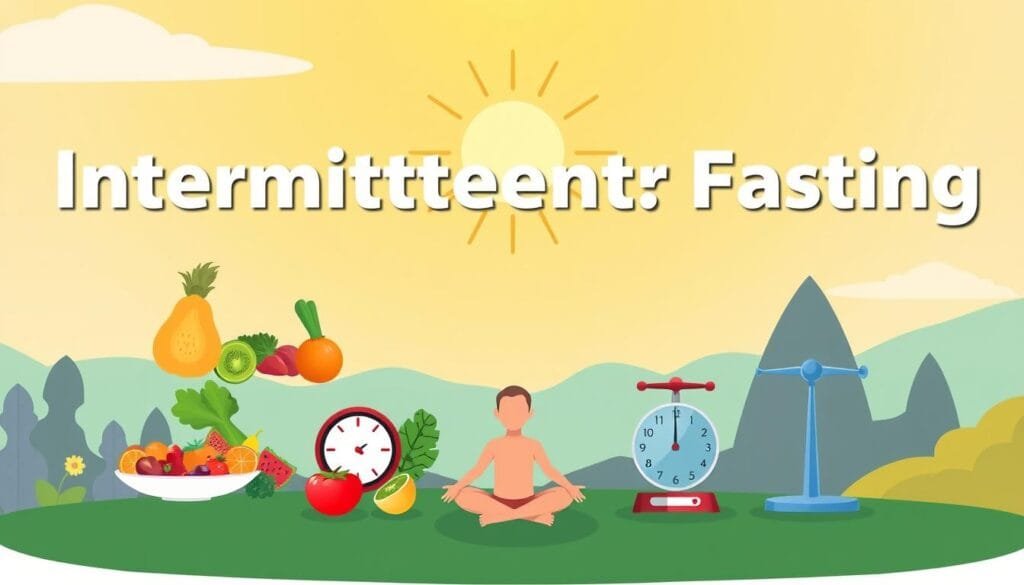In today’s fast world, many are trying intermittent fasting (IF) to simplify their lives and get healthier. It’s a top health trend, helping some reach their wellness goals. But what is IF, and how do you start as a beginner?
A personal story inspired my journey with IF. My colleague Sarah was tired and had trouble managing her weight. She tried IF and felt more focused and energized, losing weight too. Her success made me curious, so I started researching and trying it out.
Learning about IF, I found it involves fasting and eating cycles. It can help with weight loss, improve health, and boost brain function. But, it’s crucial to pick the right method and do it safely, especially if you have health issues. This guide will cover IF basics, benefits, how to start, and safety tips.
Key Takeaways
- Intermittent fasting involves cycling between periods of fasting and eating, and it can offer a range of potential benefits.
- There are different styles of intermittent fasting, including fasting for a set number of hours each day, alternate-day fasting, and the 5:2 plan.
- For beginners, starting with a simple 16:8 or 18:6 fasting schedule is a good approach.
- Choosing an intermittent fasting method that is realistic and achievable for your lifestyle is key to success.
- Consulting with a healthcare professional is recommended to ensure intermittent fasting is safe and appropriate for your individual needs.
What is Intermittent Fasting?
Intermittent fasting (IF) is a way of eating that alternates between fasting and eating. It focuses on when you eat, not what. This method is popular for improving health, losing weight, and boosting brain function.
Understanding the Basics of Intermittent Fasting
IF doesn’t tell you what to eat. It’s about when to eat. You fast for a while and then eat. This helps your body use fat for energy. It’s good for your body and mind.
Different Types of Intermittent Fasting Methods
There are many ways to do intermittent fasting:
- The 16/8 Method (Leangains protocol): Fast for 16 hours, eat in an 8-hour window.
- Eat-Stop-Eat: Fast for 24 hours, once or twice a week.
- The 5:2 Diet: Eat 500-600 calories on two days a week, eat normally other days.
Fasting has been around for ages, used for health and spiritual reasons. Research shows it can help with weight loss and improve health and brain function.
Benefits of Intermittent Fasting
Intermittent fasting is getting more attention for its benefits in weight loss and health. It can help with weight loss, improve metabolic health, and prevent diseases. Research shows it can be beneficial when done safely and correctly.
Weight Loss and Fat-Burning Benefits
One key benefit of intermittent fasting is its help in losing weight and burning fat. When fasting, the body makes more human growth hormone (HGH) and less insulin. This can help the body use fat for energy, leading to weight loss over time.
Studies have found that alternate-day fasting works as well as a low-calorie diet for weight loss.
Improved Metabolic Health and Disease Prevention
Intermittent fasting also improves metabolic health and lowers disease risk. It can reduce inflammation and improve insulin sensitivity. This may help prevent diseases like type 2 diabetes, Alzheimer’s, and stroke.
Some research says it’s as good as other diets for preventing obesity-related diseases. But, more studies are needed to fully understand its benefits.
It’s important to talk to a healthcare professional before starting intermittent fasting. This is especially true for those with health conditions or concerns.
“Intermittent fasting has been shown to be effective for weight loss and improving metabolic health, but it’s crucial to approach it with caution and under the guidance of a healthcare provider.”
How Intermittent Fasting Affects Your Body
Intermittent fasting (IF) changes your body in many ways. It starts repair processes, changes hormone levels, and uses fat for energy. Knowing these effects can help you decide if IF is right for you.
Changes in Hormone Levels During Fasting
When you fast, your body’s hormones change. Human growth hormone (HGH) goes up, and insulin goes down. This helps burn fat and keep muscle.
Fasting also lowers ghrelin, the hunger hormone, and raises leptin, the fullness hormone. This helps control hunger and cravings.
Cellular Repair and Autophagy
Intermittent fasting boosts autophagy, a cellular recycling process. It breaks down and recycles damaged cells, improving function and regeneration. This can lead to less inflammation, better metabolism, and longer life.
Learning about intermittent fasting works, intermittent fasting hormones, and intermittent fasting cellular repair helps you decide if it’s right for you.
“Intermittent fasting has shown to improve metabolic features crucial for brain health, including reducing oxidative stress, inflammation, blood sugar levels, and insulin resistance.”
| Potential Benefits of Intermittent Fasting | Potential Drawbacks of Intermittent Fasting |
|---|---|
|
|
How to Start Intermittent Fasting
Starting intermittent fasting might seem hard at first. But, with the right steps, it can become a lasting change. For newbies, the 16/8 method is easy and simple. It means fasting for 16 hours and eating for 8 hours, like skipping breakfast.
Choosing the Right Fasting Method for Beginners
Another easy way is to skip meals when you can. It’s key to start slow and find a schedule that works for you. Make sure to drink plenty of water, handle hunger, and talk to a doctor if you have health issues.
Tips for Easing into Intermittent Fasting
- Start with a 12-hour fast and gradually increase the duration over time.
- Consume non-caloric liquids like water, sparkling water, and tea during the fasting window.
- Opt for protein-rich foods like eggs, chicken, turkey, and tuna salad when breaking your fast.
- Personalize your fasting schedule based on your daily routine and preferences.
- Manage hunger and cravings by staying hydrated and distracting yourself with activities.
Finding the right fasting method is key. With some trial and patience, you’ll find what works for you. This will help you reach your health and wellness goals.
“The hardest part of intermittent fasting is just getting started. Once you get used to it, it becomes a natural part of your routine.”
Popular Intermittent Fasting Schedules
Intermittent fasting is a popular way to manage weight and improve health. The 16/8 method, also known as the Leangains protocol, is very common.
The 16/8 Method (Leangains Protocol)
The 16/8 schedule means fasting for 16 hours and eating in an 8-hour window. Skipping breakfast and eating from noon to 8 PM works for many. It’s seen as easy and sustainable.
A study in Nutrition and Healthy Aging found people lost about 3% of their body weight. They ate 350 fewer calories daily. This is a great start for beginners, with a short fasting period and flexible eating times.
“Time-restricted fasting, such as following a 16:8 schedule (fasting for 16 hours and having an eight-hour eating window), is one of the most commonly used methods of intermittent fasting, particularly for beginners.”
Other popular intermittent fasting schedules include the 5:2 diet, Eat Stop Eat, alternate-day fasting, and the Warrior Diet. These offer different patterns to fit various needs and goals.
Success in intermittent fasting comes from sticking to a schedule you like. Try the 16/8 intermittent fasting Leangains protocol and others to find what suits you best.
Meal Planning for Intermittent Fasting
When you’re on an intermittent fasting plan, it’s important to eat foods that are full of nutrients. You should aim for lean proteins, healthy fats, and complex carbs. Also, don’t forget to drink plenty of water, black coffee, or unsweetened tea.
The timing of your meals is crucial. But, the quality of your food is just as important. Eating well during your eating window helps you stay healthy and feel good.
What to Eat During Your Eating Window
To get the most out of your intermittent fasting, try these foods:
- Lean proteins: Chicken, turkey, fish, eggs, and legumes
- Healthy fats: Avocado, nuts, seeds, olive oil, and fatty fish
- Complex carbohydrates: Whole grains, quinoa, sweet potatoes, and oats
- Fruits and vegetables: A variety of colorful produce packed with vitamins, minerals, and fiber
| Food Group | Examples |
|---|---|
| Lean Proteins | Chicken, turkey, fish, eggs, legumes |
| Healthy Fats | Avocado, nuts, seeds, olive oil, fatty fish |
| Complex Carbohydrates | Whole grains, quinoa, sweet potatoes, oats |
| Fruits and Vegetables | A variety of colorful produce |
For successful intermittent fasting meal planning, choose whole, nutrient-rich foods. These will keep you full and happy during your eating time.
“Proper nutrition is key when following an intermittent fasting lifestyle. Choosing whole, unprocessed foods during your eating window will help you maximize the benefits of this approach.”
Intermittent Fasting for Weight Loss
Many people try intermittent fasting for weight loss. It works by limiting when you can eat, which means you eat fewer calories. The fasting also changes your hormones, helping burn fat and lose weight.
Studies show intermittent fasting can help with weight loss. Some people lost up to 13% of their starting weight. But, it’s key to eat healthy foods during your eating times for lasting weight loss.
How Intermittent Fasting Aids Weight Loss
- Reduces calorie intake by limiting the eating window
- Promotes hormonal changes that support fat burning, such as increased human growth hormone and decreased insulin levels
- Allows for the body to enter a state of ketosis, where it burns fat for fuel instead of carbohydrates
- Boosts metabolic rate and may enhance fat oxidation during fasting periods
“Intermittent fasting can be a powerful tool for weight loss, but it’s important to pair it with a healthy, balanced diet and regular exercise for the best results.” – Jessica Bishop, Dietetic Intern at OSF HealthCare
The success of intermittent fasting for weight loss is similar to other diets. The 16/8 method, fasting for 16 hours and eating for 8, is popular for weight loss.
Intermittent fasting can be a valuable tool for weight loss when part of a healthy lifestyle. Always talk to a healthcare professional to see if it’s right for you.
Intermittent Fasting and Exercise
Intermittent fasting and exercise together can be very beneficial. Working out while fasting might increase fat burning and improve how your body handles insulin. But, you should listen to your body and adjust your workout intensity. Some people might feel more tired or weak during these workouts.
Studies show that fasting workouts can lead to more fat loss than working out after eating. Yet, a 2014 study found no difference in weight loss between fasting and eating before exercise. It’s key to find the best timing and balance for you.
Combining fasting and exercise may also slow down aging and disease. But, it’s important to consider the type of exercise and when you eat before and after. Prolonged fasting and intense exercise can harm performance and cause muscle loss.
| Potential Benefits | Potential Drawbacks |
|---|---|
|
|
When exercising during fasting, it’s vital to listen to your body and stay hydrated. Timing your meals and workouts right can help you avoid problems. Always talk to a healthcare provider before starting any new fasting or exercise program.
“Intermittent fasting combined with exercise can provide a range of benefits, but it’s crucial to find the right balance that works for your individual needs and fitness goals.”
Is Intermittent Fasting Safe?
Intermittent fasting is safe for most healthy adults. But, it’s not right for everyone. It’s important to know who should be careful or avoid it.
Who Should Avoid Intermittent Fasting?
Some people should be careful or not try intermittent fasting. This includes:
- Individuals with diabetes or other issues with blood sugar regulation
- Those who are underweight or have a history of eating disorders
- Pregnant or breastfeeding women
- People taking certain medications
Fasting can affect female hormones and menstrual cycles. If you’re thinking about trying it, especially with health issues, talk to a doctor first. They can help decide if it’s safe for you.
Intermittent fasting might not be good for people who are very active, especially morning exercisers. It could slow down recovery. Women should also be careful, as most studies were on men. More research is needed for women.
Even with fasting, eating healthy foods is key. Focus on leafy greens, healthy fats, lean proteins, and complex carbs. If you’re fasting, talk to a dietitian. They can make sure you get enough protein and fiber during your eating times.
Potential Side Effects of Intermittent Fasting
Intermittent fasting can be good for your health, but it might have some side effects. You might feel hungry, especially when you’re not eating. Your body might also feel weak or your mind might not work as well at first.
Other side effects include:
- Headaches – A 2020 study found that some people got mild headaches when fasting.
- Fatigue – But, another study in 2020 said fasting might actually make you feel less tired as you get used to it.
- Digestive issues – At first, fasting can make you lose water and salt, leading to dehydration and stomach problems.
- Irritability – A 2016 study with 52 women found they felt more irritable when fasting than when they weren’t.
These side effects usually go away as your body gets used to fasting. But, if they don’t get better or get worse, fasting might not be for you. Drinking plenty of water and starting slow can help avoid these intermittent fasting side effects.
| Side Effect | Prevalence | Study Details |
|---|---|---|
| Hunger | Higher hunger scores | A study involving 112 people found those assigned to an intermittent energy restriction group consuming 400 or 600 calories on two nonconsecutive days every week reported higher hunger scores than those on a low-calorie diet with continuous calorie restriction. |
| Headaches | Mild headaches | 18 studies on intermittent fasting showed that some participants experienced mild headaches during fasting periods. |
| Irritability | Significantly more irritable | A 2016 study with 52 women found participants reported being significantly more irritable during an 18-hour fasting period than during nonfasting periods. |
| Fatigue | May reduce fatigue | A 2020 study suggested that intermittent fasting may reduce fatigue as the body becomes adjusted to regular fasting periods. |
| Sleep Disturbances | 15% of participants | Studies indicate that sleep disturbances related to fasting were reported by 15% of 1,422 participants in fasting regimens lasting 4–21 days, with dehydration being a contributing factor. |
Some people should not try intermittent fasting. This includes pregnant or nursing women, young children and teens, older adults who are weak, people with weakened immune systems or eating disorders, those with dementia, and anyone who has had a brain injury or concussion.
How to Start Intermittent Fasting
Starting intermittent fasting is easy and simple. Many start with the 16/8 method. This means fasting for 16 hours and eating for 8 hours.
It’s about skipping breakfast and waiting longer to eat again. This can be a good starting point.
Finding a fasting schedule that fits you is key. Try different fasting times and eating windows. Stay hydrated and eat nutrient-rich foods when you can.
As you get used to it, you can make your fasts longer. Remember, it’s about finding a routine you can keep up with.
Intermittent fasting isn’t for everyone. Be patient and listen to your body. With some trial and error, you’ll find the right plan for you.
Key Steps to Start Intermittent Fasting
- Choose a fasting method that fits your schedule and preferences, such as the 16/8 method or alternate-day fasting.
- Gradually increase the duration of your fasts, starting with shorter periods and gradually extending the time between meals.
- Stay hydrated by drinking plenty of water, herbal tea, or other non-caloric beverages during your fasting periods.
- Consume nutrient-dense foods during your eating window, focusing on whole, unprocessed ingredients.
- Listen to your body and adjust your fasting schedule as needed to ensure it’s sustainable and comfortable for you.
Starting with intermittent fasting can change your life. But, do it with patience and self-awareness. Find the right method and make it a part of your life to enjoy its benefits.
Tips for Beginners
Starting an intermittent fasting journey is exciting, but beginners often feel hungrier and crave more. It’s normal, and with the right tips, you can handle these feelings. You’ll also enjoy the benefits of intermittent fasting.
Stay Hydrated
Drinking water, black coffee, or unsweetened tea is crucial. These drinks have no calories but can make you feel full. They help control hunger.
Engage in Light Activity
When you feel hungry, try a short walk or some stretching. These activities can take your mind off hunger. They make fasting easier.
Focus on Nutrient-Dense Foods
Eat nutrient-rich foods during your eating times. Choose lean proteins, healthy fats, and complex carbs. Also, include fiber-rich fruits and veggies to stay full.
Gradually Increase Fasting Duration
Beginners should start with short fasts and gradually get longer. This gradual increase helps your body adjust. It makes longer fasts easier.
Managing hunger and cravings takes time and patience. Use these tips to handle the initial challenges. They will help you enjoy the benefits of intermittent fasting fully.
Intermittent Fasting for Women
Intermittent fasting (IF) can be good for some women, but there are things to watch out for. It might mess with female hormones and menstrual cycles, especially for those who are already at a healthy weight.
Women should start slow with intermittent fasting. It’s important to talk to a healthcare professional, especially if you’ve had eating disorders or reproductive health issues.
Precautions and Considerations for Females
- Intermittent fasting may lead to changes in menstrual cycles and hormonal imbalances in some women.
- Prolonged fasting and caloric restriction can potentially impact a woman’s fertility, mental health, and overall well-being.
- Women with certain medical conditions, such as thyroid issues, blood sugar problems, or a history of eating disorders, should exercise caution with intermittent fasting.
- Pregnant or breastfeeding women should avoid intermittent fasting, as it may not provide the necessary nutrients for the mother and child.
To make sure the benefits of intermittent fasting are worth it, women should start slow and listen to their bodies. Talking to a healthcare professional can help find the best plan for your needs and goals.
“Adhering to a modified approach of intermittent fasting, such as shorter fasting periods, is recommended for women.”
| Statistic | Findings |
|---|---|
| A 2005 study | Blood sugar control worsened in women after three weeks of intermittent fasting, which was not the case in men. |
| A 2021 study of 18 women with PCOS | Showed improved menstrual cycle regularity and reduced body fat over a 6-week period. |
| Intermittent fasting reduced insulin levels by 29% and insulin resistance by 19% in a study of over 100 overweight or obese women. | |
| Women over the age of 60 following a daily 16/8 intermittent fasting plan | Saw an average body fat loss of 2 kilograms (about 4.5 pounds) after 6 weeks. |
Success Stories and Testimonials
Intermittent fasting has changed many lives for the better. It helps with weight loss and improves health. Let’s look at some amazing success stories and real-life experiences.
Kayla Cox lost 65 pounds in one year with intermittent fasting. She kept going and lost 80 pounds from 222 pounds. Kayla lost about a pound a week. She followed a 16:8 fasting window and later tried a one-meal-a-day (OMAD) plan. She also walked every day and had a cheat day.
“The simplicity of intermittent fasting and moderate exercise has been a game-changer for me. I no longer struggle with restrictive diets or complicated meal plans. Instead, I’ve found that focusing on portion control and making sustainable lifestyle changes has been the key to my weight loss journey.” – Kayla Cox
Melissa Bunch lost over 100 pounds in 10 months with intermittent fasting. She started at 238 pounds in June 2021 and reached 136 pounds by March 2022. Her story shows the amazing results possible with this method.
Jen T. from Michigan lost 46 pounds in four months. She started at 174.6 pounds in January 2021. Jen followed a 16:8 fasting plan and later tried OMAD (22:2). She cut sugar and ate less carbs. Now, she feels full of energy, sleeps better, and has no headaches.
These stories show how effective intermittent fasting can be. By being consistent, patient, and making lasting changes, people can reach their goals and feel better overall.
Conclusion
Intermittent fasting is a popular way to eat that cycles between fasting and eating. It can help with weight loss, improve health, and boost brain function. But, it’s key to pick the right method and start slowly. Also, talk to a doctor, especially if you have health issues.
Adding intermittent fasting to a healthy diet and active life can boost your health. It can lead to weight loss, better metabolism, and more health perks. But, more research is needed to fully understand its long-term effects.
When trying intermittent fasting, pay attention to how your body feels. Keep track of your progress and make changes if needed. Finding a way to enjoy intermittent fasting can be a great step towards better health.
FAQ
What is intermittent fasting?
Intermittent fasting, or IF, is when you eat in cycles. You fast for certain hours and then eat for others. It doesn’t tell you what to eat, just when.
What are the different types of intermittent fasting methods?
There are several IF methods. The 16/8 method means fasting for 16 hours and eating for 8. The eat-stop-eat method involves fasting for 24 hours, once or twice a week. The 5:2 diet limits calories to 500-600 on two days a week.
What are the potential benefits of intermittent fasting?
IF might help you lose weight and improve your health. It can also boost your brain function. When you fast, your body makes more growth hormone and less insulin, helping repair cells.
How does intermittent fasting affect the body?
Fasting changes your body in many ways. It increases growth hormone and decreases insulin. Cells also start to repair themselves, like recycling old parts.
What is the 16/8 method for intermittent fasting?
The 16/8 method, or Leangains protocol, is popular. You fast for 16 hours and eat for 8. It’s simple, like skipping breakfast and eating lunch and dinner.
What should I eat during my intermittent fasting eating window?
Eat nutrient-rich foods during your eating time. Include lean proteins, healthy fats, and complex carbs. Fruits and veggies are good too.
How can intermittent fasting help with weight loss?
IF can help you lose weight by eating less. You’ll naturally eat fewer calories. Hormonal changes, like more growth hormone and less insulin, also help burn fat.
Can I combine intermittent fasting with exercise?
Yes, you can do IF and exercise together. Fasting workouts might burn more fat and improve insulin sensitivity. But, you might feel tired or weak, so listen to your body.
Who should be cautious or avoid intermittent fasting?
Some should be careful or avoid IF. This includes people with diabetes, those who are underweight or have eating disorders, pregnant or breastfeeding women, and those on certain meds.
What are the potential side effects of intermittent fasting?
Hunger is the main side effect of IF. You might also feel weak or have trouble thinking clearly at first. Other side effects include headaches, fatigue, and digestive issues.
How can I start intermittent fasting as a beginner?
Start by skipping breakfast and fasting longer between meals. The 16/8 method is a good place to begin.
How can I manage hunger and cravings during intermittent fasting?
Drink water, black coffee, or unsweetened tea to feel full. Short walks can also help distract from hunger. Eating nutrient-rich foods during your eating window can prevent extreme hunger.
Are there any special considerations for women practicing intermittent fasting?
Women should be cautious with IF. It might affect hormones and menstrual cycles, especially for those at a healthy weight. Stop IF if you have concerns, like missing periods.
Can you share any success stories or testimonials from people who have tried intermittent fasting?
Many have found IF helpful. They’ve lost weight, improved their health, and felt more mentally clear.
Source Links
- A Beginner’s Guide to Intermittent Fasting | The Pursuit | University of Michigan School of Public Health | Alternative Therapies | Dietetics | Nutrition | Obesity – https://sph.umich.edu/pursuit/2019posts/beginners-guide-to-intermittent-fasting.html
- 18:6 Intermittent Fasting: A Simple Guide (2024) | Season – https://www.seasonhealth.com/blog/18-6-intermittent-fasting-guide
- Six ways to do intermittent fasting: The best methods – https://www.medicalnewstoday.com/articles/322293
- Intermittent Fasting 101 — The Ultimate Beginner’s Guide – https://www.healthline.com/nutrition/intermittent-fasting-guide
- Intermittent Fasting: What is it, and how does it work? – https://www.hopkinsmedicine.org/health/wellness-and-prevention/intermittent-fasting-what-is-it-and-how-does-it-work
- Is intermittent fasting good for you? – https://www.mayoclinic.org/healthy-lifestyle/nutrition-and-healthy-eating/expert-answers/intermittent-fasting/faq-20441303
- Health benefits of intermittent fasting (and tips for making it work) – https://www.uclahealth.org/news/article/health-benefits-of-intermittent-fasting-and-tips-for-making-it-work
- What Are the Pros and Cons of Intermittent Fasting? – https://www.massgeneralbrigham.org/en/about/newsroom/articles/pros-and-cons-of-intermittent-fasting
- Intermittent fasting: Benefits, how it works, and is it right for you? – https://health.ucdavis.edu/blog/good-food/intermittent-fasting-benefits-how-it-works-and-is-it-right-for-you/2022/02
- 10 Health Benefits of Intermittent Fasting – https://www.healthline.com/nutrition/10-health-benefits-of-intermittent-fasting
- What Happens to Your Body When You Do Intermittent Fasting – https://www.eatingwell.com/article/8023728/what-happens-to-your-body-when-you-do-intermittent-fasting/
- The 4 Things I Wish I Had Known Before I Started Intermittent Fasting – https://www.thespruceeats.com/what-to-know-before-intermittent-fasting-5216293
- How Do I Start Fasting? Intermittent Fasting – https://www.medicinenet.com/how_do_i_start_fasting/article.htm
- 8 Tips to Start Intermittent Fasting and Stick With It – https://www.womenshealthmag.com/weight-loss/a38191815/starting-sticking-with-intermittent-fasting/
- Intermittent Fasting: 7 Schedules for Weight Loss – https://www.verywellhealth.com/intermittent-fasting-7510668
- Not Sure Where To Start With Intermittent Fasting? The 16:8 Schedule Is A Great Entry Point – https://www.womenshealthmag.com/weight-loss/a29349587/intermittent-fasting-schedule/
- 5 Intermittent Fasting Methods, Reviewed – https://www.healthline.com/nutrition/6-ways-to-do-intermittent-fasting
- Beginner Intermittent Fasting Meal Plan: Benefits & Tips for Success – https://www.cookunity.com/blog/beginner-intermittent-fasting-meal-plan
- 16/8 Intermittent Fasting: Meal Plan, Benefits, and More – https://www.healthline.com/nutrition/16-8-intermittent-fasting
- Intermittent fasting does it work and is it safe? – https://www.osfhealthcare.org/blog/intermittent-fasting-does-it-work-and-is-it-safe/
- Jennifer Aniston Says She Noticed a "Big Difference" When Following This Diet – https://www.health.com/weight-loss/jennifer-aniston-intermittent-fasting-16-8-diet
- Intermittent fasting and exercise: How to do it safely – https://www.medicalnewstoday.com/articles/intermittent-fasting-and-working-out
- How to Exercise Safely During Intermittent Fasting – https://www.healthline.com/health/how-to-exercise-safely-intermittent-fasting
- Working Out While Intermittent Fasting – https://www.prospectmedical.com/resources/wellness-center/working-out-while-intermittent-fasting
- Intermittent Fasting: How It Works – https://health.clevelandclinic.org/intermittent-fasting-4-different-types-explained
- Diet A to Z: Intermittent Fasting – https://www.webmd.com/diet/a-z/intermittent-fasting
- Is Intermittent Fasting Safe & Effective for Weight Loss? – https://www.uhhospitals.org/blog/articles/2023/10/is-intermittent-fasting-safe-and-effective-for-weight-loss
- 9 Possible Intermittent Fasting Side Effects – https://www.healthline.com/nutrition/intermittent-fasting-side-effects
- Intermittent Fasting: Benefits, Side Effects, Quality of Life, and Knowledge of the Saudi Population – https://www.ncbi.nlm.nih.gov/pmc/articles/PMC9998115/
- The Myths & Facts of Intermittent Fasting | Nerd Fitness – https://www.nerdfitness.com/blog/a-beginners-guide-to-intermittent-fasting/
- Intermittent fasting for beginners: Expert tips on how to get started – https://www.livescience.com/intermittent-fasting-for-beginners
- Intermittent Fasting for Real People: Practical Tips to Eat on Schedule – https://www.healthline.com/health/food-nutrition/intermittent-fasting-for-real-people-practical-tips-to-eat-on-schedule
- A Beginner’s Guide to Intermittent Fasting | Priority Physicians – https://priorityphysicianspc.com/guide-for-intermittent-fasting/
- Intermittent Fasting For Women: A Beginner’s Guide – https://www.healthline.com/nutrition/intermittent-fasting-for-women
- Intermittent Fasting For Women: Here’s What You Need To Know – https://zoe.com/learn/intermittent-fasting-for-women
- What You Need to Know about Intermittent Fasting for Women – https://www.eatingwell.com/article/7874733/intermittent-fasting-for-women/
- I did intermittent fasting and it changed my life – https://www.newsweek.com/i-did-intermittent-fasting-it-changed-my-life-1861673
- Success Stories – https://www.ginstephens.com/success-stories.html
- Registered Dietitian’s Guide to Intermittent Fasting – https://culinahealth.com/registered-dietitian-intermittent-fasting-nutrition-tips/
- Mya Care – https://myacare.com/blog/the-pros-and-cons-of-intermittent-fasting













